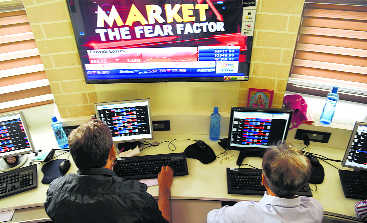Sushma Ramachandran
Senior Journalist
Ten years after the iconic investment bank Lehman Brothers collapsed, triggering the worst global financial crisis since the Great Depression, the world is still pondering over whether such a catastrophe can happen again. The jury is out on that question as there are potent arguments on both sides of the debate. Whichever side one takes, however, there is one irrefutable fact. And that is the world and India, like other emerging economies, has learnt many lessons from the event. Some of these lessons have been acted upon and many have not, but the threat that such a crisis can recur again hangs like a Damocles sword over the world economy.
False hypothesis
The original hypothesis that India was immune to the global contagion has been proved over time to be false. At the time, it was contended that Indian banks had little exposure to the scam-hit international financial systems, hence this country had little to worry about. There was even a sense of satisfaction that the public sector banking system had weathered the storm better than the developed world's private financial institutions. This smug self assurance did not last long as the global crisis led to a crash in stock markets wiping out 50 per cent of market value over the period from January 2008 to March 2009. Exports suffered a serious setback as demand crashed in developed country markets. Economic growth dipped from 9 per cent in the previous year to 6.7 per cent during 2008-9. This prompted then Finance Minister Pranab Mukherjee to launch a stimulus package which pushed the fiscal deficit up from 2.5 to 6 per cent. Subsequent Finance Ministers have struggled to bring the deficit back to manageable levels but it has yet to reach the pre-crisis levels.
Deeper than perceived
The first lesson for India has thus been that globalisation has pervaded deeper into the economy than has been perceived earlier. The sub-prime crisis that originated in the U.S. housing market through financial entities like Fannie Mae and Freddie Mac had spread through venerable Wall Street players like Merrill Lynch and Bear Stearns. The sub-prime mortgages had been bundled and sold as financial instruments throughout the international financial system, ultimately leading to the bankruptcy of the $ 600 dollar behemoth, Lehman Brothers. While it may not have had a direct impact on the Indian banking system, it did lead to the stock market crash, slowdown of export industries leading to huge job losses and ultimately a decline in growth. In other words, India is linked willy nilly to the rest of the world and policies need to be evolved keeping this fact in mind.
Even for the developed world, the impact of globalisation as seen in the 2008 crisis led to the growing popularity of political ideologies that promote a more insular, protectionist attitude. This, in turn, has been the genesis of the rise of politicians like the present U.S. President Donald Trump who makes it a point to highlight his anti-globalisation approach in a wide swathe of policies from trade to immigration.
The second lesson, a narrower one, has been for investors in the stock markets. Those who held on to their stocks during the difficult times of 2008 and 2009 were rewarded by the market revival in 2010 and the subsequent boom in the following years. Holding onto your investments can thus be highly beneficial in the medium and long run. However, financial experts clarify that investments need to be diversified so that losses in one sector can be made up in another. In addition, there needs to be greater financial education before making such investments.
Independent assessment
The third and apparently simple lesson, is that lending by banks needs to be based on the premise that the loan will be repaid. It was the confidence of giant international investment banks and other financial institutions that the instruments being sold to them were viable that led to the ultimate crisis in 2008. These institutions presumed that the sub-prime mortgages were safe purely because these were being bought by everyone, without making any independent assessment of their viability. Sadly, one of the many reasons for the NPAs crisis in this country is due to the presumption that large well-known corporates are not likely to default in payments. This has been mentioned by former RBI governor Raghuram Rajan who has listed the lack of sufficient due diligence as one of the factors leading to the rise of NPAs. In other words, the lacuna that afflicted the global financial systems ultimately became a malaise in this country as well.
The impact still lingers
Hence ten years down the line, the impact of the crisis still lingers both in India and the rest of the world. The positive aspects of globalisation are being downplayed in countries like the U.S. which is trying to get better terms from all its trade partners by imposing punitive tariffs. A trade war could reverse decades of efforts to establish a rules-based multilateral trading system. High oil prices are eroding the economic development efforts of emerging economies. This is in tandem with decline of many currencies of these countries including India against the dollar. Clearly there may not be another massive financial crisis as in 2008 but the global economy continues to face challenges to growth. These need to be handled keeping the lessons of the past in mind.
Unlock Exclusive Insights with The Tribune Premium
Take your experience further with Premium access.
Thought-provoking Opinions, Expert Analysis, In-depth Insights and other Member Only Benefits
Already a Member? Sign In Now











